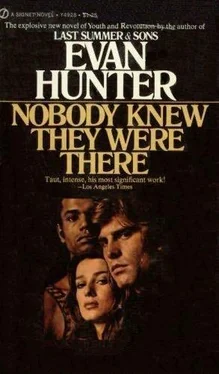Evan Hunter - Nobody Knew They Were There
Здесь есть возможность читать онлайн «Evan Hunter - Nobody Knew They Were There» весь текст электронной книги совершенно бесплатно (целиком полную версию без сокращений). В некоторых случаях можно слушать аудио, скачать через торрент в формате fb2 и присутствует краткое содержание. Город: New York, Год выпуска: 1971, ISBN: 1971, Издательство: Doubleday & Company, Жанр: Проза, на английском языке. Описание произведения, (предисловие) а так же отзывы посетителей доступны на портале библиотеки ЛибКат.
- Название:Nobody Knew They Were There
- Автор:
- Издательство:Doubleday & Company
- Жанр:
- Год:1971
- Город:New York
- ISBN:978-0094575004
- Рейтинг книги:4 / 5. Голосов: 1
-
Избранное:Добавить в избранное
- Отзывы:
-
Ваша оценка:
- 80
- 1
- 2
- 3
- 4
- 5
Nobody Knew They Were There: краткое содержание, описание и аннотация
Предлагаем к чтению аннотацию, описание, краткое содержание или предисловие (зависит от того, что написал сам автор книги «Nobody Knew They Were There»). Если вы не нашли необходимую информацию о книге — напишите в комментариях, мы постараемся отыскать её.
Nobody Knew They Were There — читать онлайн бесплатно полную книгу (весь текст) целиком
Ниже представлен текст книги, разбитый по страницам. Система сохранения места последней прочитанной страницы, позволяет с удобством читать онлайн бесплатно книгу «Nobody Knew They Were There», без необходимости каждый раз заново искать на чём Вы остановились. Поставьте закладку, и сможете в любой момент перейти на страницу, на которой закончили чтение.
Интервал:
Закладка:
We stand awkwardly silent
“Would you like to come up for a nightcap?” I ask.
“You know it wouldn’t be a nightcap,” she answers.“Would you like to come to bed with me then?”
“No.”
“Okay. Good-bye, Sara.”
“Arthur… if I came upstairs, it’d only be because I feel sorry for you.”
“I certainly wouldn’t want you to feel sorry for me, Sara.”
“Then please don’t ask me.”
“I’ve already asked you, and you’ve already said no. And I’ve already said good-bye.”
“You mean good night”
“I mean good-bye. Good-bye, Sara,” I say, and go into the lobby, and walk to the elevator, and take it up to the fifth floor, and go into my room.
I am undressed and in bed when the telephone rings.
“Arthur?”
“Yes, Sara.”
“Why do I worry about you?”
“I don’t know. Why do you, Sara?”
“You’re making me feel sorry for you. That isn’t fair, Arthur.”
“Sara, do you want to come here?”
“No. I have studying to do.”
“Then why did you call me?”
“I don’t know.”
“All right then, why don’t you do your studying, and I’ll go to sleep.”
“All right, Arthur,” she says, and hangs up.
I turn out the light and pull the covers to my throat I lie there silently with my eyes open. Then I put on the light again, and dial Sara’s number.
“Yes?” she says.
“Sara, what the hell do you want from me?”
“I don’t know.”
“Do you want to come here, or don’t you?”
“No, I don’t”
“Why did you ask Seth to invite me to his party?”
“I don't know.”
“Look,” I say, “why don’t you come over here and stop this nonsense?”
“It isn’t nonsense. I love Roger.”
“The hell with Roger.”
“Don’t say that.”
“Sara, you are an exasperating person.”
“So are you.”
“I'd like you to come here.”
“No. You come here.”
“I'm undressed and in bed.”
“So get out of bed and get dressed.”
“I don't know where you live.”
“I’ll tell you where I live.”
“I have a very bad sense of direction.”
“If you want to see me so much,” Sara says, “you’ll come here.”
“I thought you had studying to do.”
“I do. If you want to come here and watch me study, you can.”
“That sounds exciting as hell.”
“If you don’t want to come, then don’t”
“What about Gwen?”
“She won’t be home tonight.”
“When will she be home?”
“Tomorrow morning.”
“It's tomorrow morning already.”
“It’s later than you think,” she says, and I cannot tell whether or not she is smiling.
I hesitate a moment longer. Then I sigh and say, “Where do you live, Sara?”
She has given me explicit directions, but I am still uneasy. It is close to three o’clock and the streets are deserted. I am not fearful of being mugged or rolled; this is not New York City. But it is a university town, with a great many young girls living alone in apartments, and a middle-aged man abroad in the empty hours of the night might reasonably attract the attention of a cruising police car. I am to walk through the small park west of Chatham Hall, and I will then come face to face with Jaeger, the engineering building. I am then to make a right turn and walk the short block to Delaney, making a left there. Sara’s building is the third house on the right-hand side of the street
It is a two-story structure, white clapboard, architecturally reminiscent of Seth’s place, but without a picture window facing the street. Instead, there are symmetrically spaced sash-hung windows on both stories and running around the side of the house. Sara’s apartment is in the rear. I walk past the first door at the back of the house (which leads, Sara has told me, to an apartment inhabited by five medical students) and then to the second door, wooden bottom panel, four panes of glass forming the upper portion. I try the knob, but the door is locked. I put my face close to one of the panes and look inside. There is a steep flight of steps leading upstairs. The staircase is dark. I rap on the door.
Silence.
I rap again. I fully expect a police torch to illuminate me at any moment. The night is still, even the wind has died. I debate knocking again. Surely she has heard me. Surely even the five medical students have heard me. A light goes on at the top of the steps. She comes down swiftly and unlocks the door for me. She is still wearing her black sweater and slacks, but she has divested herself of her beads.
“Hi,” she says. “You found it”
“I was scared stiff.”
“Some assassin.”
I follow her up the steps. We turn left and walk through a small kitchen. A note scotch-taped to the refrigerator reads:
Horne—
Excuse the mess. Got a long-distance
call just before I left, and it took
forever.
G.The kitchen leads to the bedroom, and the bedroom in turn leads to the living room. There is a sofa against two windows, a low table before it, a scatter rug on the floor. Rosenberg and Weinstein’s Civil Procedure is open on the table, a lined yellow pad beside it. A Japanese lantern covers the light bulb hanging from the ceiling. There are charcoal drawings on the walls. An open closet door reveals Sara’s beads hanging on a hook, her long black coat, her tan corduroy coat, skirts, dresses and slacks on wire hangers jammed onto a sagging wooden pole. The shelf above the pole is cluttered with boxes. The entire closet seems ready to implode into the room. I take off my coat and hang it on the door hook, over her beads. She has gone into the kitchen, and when she returns she is carrying a candle in a translucent red holder. She lights the candle and places it on the coffee table. “I don't have anything to drink,” she says, “but I can make some coffee, if you like.”
“No, thank you, I’m fine.”
“You look cold.”
“I am cold.”
“Sit down,” she says. “Please sit down.”
I sit on the couch. There is a draft coming from the windows. I shift my position. I am terribly ill at ease. I suddenly wonder how Sara felt in my hotel room. It is the first time such a thought has occurred to me, the possibility that despite her seeming poise she was as uncomfortable there as I am here. I look at her curiously. I remember that she is only twenty-one.
“Do you mind if I put on some music?” she asks. “I like music when I’m studying.”
“Go ahead.”
“I really do have to study, Arthur.”
“That’s all right.”
She moves to the record player, selects a record, and places it on the turntable. “I love this,” she says, but when the music starts, I do not recognize the tune. “I have another test on Tuesday,” she says.
“Maybe I can help you.”
“Well,” she says, and smiles. She is too polite to say that a tractor salesman would be of little if any use in cramming for an exam on procedure.
“I have a question,” I tell her.
“Ask it.”
“Why is a law student involving herself in a plot that is essentially anarchic?”
“Because I don’t believe in the law any more, Arthur.”
“Then why are you studying it?”
“Habit,” she says, and shrugs.
“That isn’t true.”
“It’s partially true. I like studying. I’m a good student.”
“But why the law?”
“I don’t know.” She shrugs again. “Maybe there’ll be law again someday.”
“There’s law now , Sara.”
“If there’s law,” she says, “why is it necessary to kill him? Why shouldn’t there be another way?”
She does not know I am a lawyer, of course. She does not know I have spent half my life with the law, and therefore she cannot begin to realize my deep feelings for it. Nor can she know, from what I have told her about myself, how truly distasteful I find the act I must commit next week. But she has asked the single question that could even at this late date cause me to change my mind, pack my bag, and head home. I consider it now with all the gravity of a jury solemnly charged: Why shouldn't there be another way?
Читать дальшеИнтервал:
Закладка:
Похожие книги на «Nobody Knew They Were There»
Представляем Вашему вниманию похожие книги на «Nobody Knew They Were There» списком для выбора. Мы отобрали схожую по названию и смыслу литературу в надежде предоставить читателям больше вариантов отыскать новые, интересные, ещё непрочитанные произведения.
Обсуждение, отзывы о книге «Nobody Knew They Were There» и просто собственные мнения читателей. Оставьте ваши комментарии, напишите, что Вы думаете о произведении, его смысле или главных героях. Укажите что конкретно понравилось, а что нет, и почему Вы так считаете.












